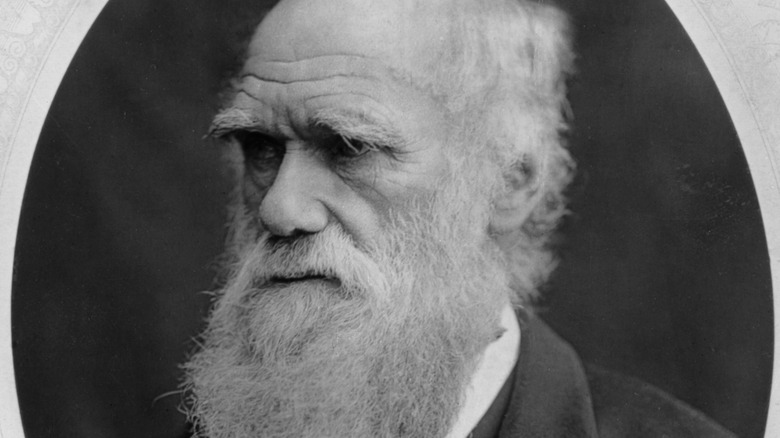What We Know About Charles Darwin's Mental Health
In December 2021, researchers published a first-of-its kind study in The Lancet that found close to half of children who responded to a global survey felt anxious, powerless, sad, helpless, and guilty about climate change. This emotional impact of climate change is starting to be recognized more and more, especially as the Covid-19 pandemic illuminated existing mental health problems and caused more to develop as people were sent into isolation and deprived of many resources they had come to rely on (via The New York Times).
It may surprise readers to learn that one of the most well-known naturalists had anxiety too, long before we had recognized the worst ways humans have impacted nature, and even before anxiety disorders were formerly recognized in the "Diagnostic and Statistical Manual of Mental Disorders (DSM)." But back in the early 19th century, Charles Darwin found himself trapped in a cloud of anxiety, much like many of the climate defenders in our world today, according to Science.
A nervous guy
In 1831, Darwin set off on The Voyage of the Beagle that would take him across the world to South America and the Galapagos Islands, where he was inspired by the wildlife to develop theories on natural selection and evolution that would transform the scientific field for centuries to come (via Galapagos Islands). In 1836 when he returned, began writing reclusively for the rest of his life. But it wasn't just that Darwin was a homebody or that the journey had filled him with enough traveling to last a lifetime (although that might be part of it).
According to a 1996 article in the Journal of the American Medical Association (JAMA), Darwin had a chronic illness that "impaired his functioning and severely limited his activities." Reviewing his writings and actions throughout his life, the JAMA authors conclude that Darwin's seclusion, nervousness regarding public speaking, and aversion to meeting with colleagues, together indicate that Darwin had panic disorders and agoraphobia.
'Anxiety neurosis'
Of course, these diagnostics weren't available at the time, otherwise Darwin may have gotten treatment for his condition and been able to go out more. Throughout the mid 20th century, anxiety disorders weren't known as such, but rather as "pantophobia" and "anxiety neurosis," according to Dialogues Clinical Neuroscience. It wasn't until 1980 when generalized anxiety disorder was officially introduced into the DSM, per the Dialogues of Clinical Neuroscience. Although it wasn't easily identified at the time, Darwin wasn't alone in his anxiety.
While we may be anxious about climate change, the pandemic, and a host of other things today, there were still plenty of things to induce anxiety back in the early 19th century, including colonialism and the Napoleonic Wars. Today, close to one-third of adults in the U.S. will experience an anxiety disorder at some point of their lives, according to the National Institutes of Mental Health.
The symptoms
Before the voyage, Darwin was more active, but his condition slowly declined and he had already retired to a country house in Kent before he reached 30, according to Science. It was there that his symptoms mostly manifested, involving "heart palpitations, shortness of breath, feelings of impending doom, hysterical crying, and severe nausea and vomiting" (via Science). Based on his writings, in which Darwin wrote he was "treading on air and vision," the authors of the JAMA article also determined that Darwin felt detached from himself at times, which is another symptom of anxiety, per Science.
Darwin's underlying anxiety is further exemplified by his reaction to his invitation to attend the 1837 Geological Society meeting, where he probably would have been a big hit. Per Science, Darwin turned down the invitation because of his fear of public speaking and anti-socialization, penning in a note to the society that, "anything which flurries me completely knocks me up afterwards and brings on violent palpitation of the heart."
The diagnosis
These writings sounded the alarm bells in doctors' minds at the time, and psychologists continued to pore over his writings to try and find a diagnosis until the end of the 20th century, per Science. Some posited that he had irritable bowel syndrome, lactose intolerance, or even arsenic poisoning (via History of Medicine). Darwin might have felt alone having these symptoms without a diagnosis and mental health resources available to him at the time. But maybe he actually preferred that everyone would just leave him alone.
Perhaps he didn't enjoy the fame that accompanied his travels and writings. In his autobiography, he acknowledged that this chronic illness — for which he had no name — took several years off his life, but at least it saved him "from the distraction of society" (via Science). Even if he didn't fully understand his diagnosis, at least he had come to accept it.
The cause
Like many mental health conditions, Darwin's anxiety was exacerbated by stressful life events. His symptoms worsened when a competitor scientist published findings similar to his about natural selection, for example, as well as when his father and child died (via Scientific American). When Darwin was just eight years old, his mother died suddenly, which one biographer told Scientific American may be a trauma that he was dealing with well into his adult life.
Due to Darwin's diligent note-taking throughout his life, we know staggering details about his physical and mental health — everything from a "slight fit of flatulence" to him being "convinced" he had heart disease, per Scientific American. What's notable about Darwin's case is that it showed how strongly disorders of the mind can influence the body, long before the gut microbiome was a term on the medical lexicon and scientists began studying this phenomenon.
If you or someone you know is struggling with mental health, please contact the Crisis Text Line by texting HOME to 741741, call the National Alliance on Mental Illness helpline at 1-800-950-NAMI (6264), or visit the National Institute of Mental Health website.





